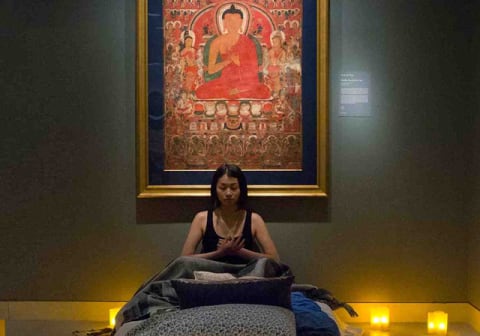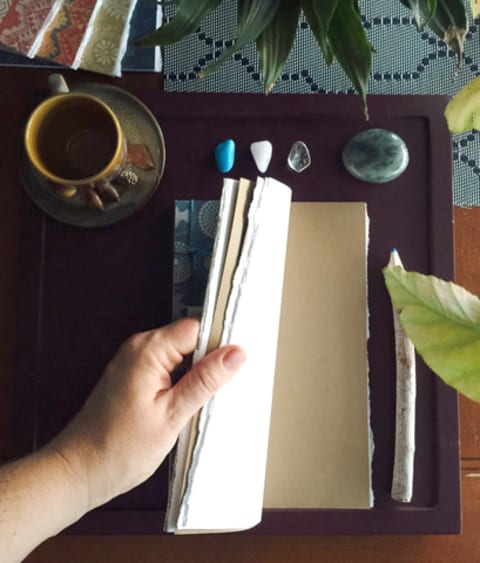Advertisement

Those who have integrated dreams into their lives have found that the "otherworld" of sleep has become more real—something to be welcomed rather than resisted. For me, it is way more than just feeling recharged. There is also a sense of freedom that comes from less attachment to daily battles, successes, failures, and illusions.
My daughter Isabella has a recurring dream that beautifully illustrates this. She is a living stop sign, forcing people to come to a complete stop before moving on with their lives. And instead of dissolving when she wakes up, the dream takes on new relevance when she revisits it during the day, reminding her to pause, reflect, and keep all the demands of her life in perspective.
1. Prepare to dream well.
There are some simple steps we can take before we go to sleep to reinstate dreams to a central place in our lives and experience firsthand why they matter. After we put our devices aside, wind down, and let go of the day, we can learn from the practices of ancient temples and do a modern-day version of dream incubation.
Synesius of Cyrene, a Greek bishop living around the year 400, called dreams oracles, always ready to serve as our "silent counselor." And dream incubation is a process of preparing our consciousness to receive guidance from our inner counselors. It can be about big life decisions but also about anything that we want more clarity and wisdom around, however trivial it may seem.

2. Have a dream-over in an inspiring space.
I love how the Rubin Museum in New York, which houses Asian art, brings dream incubation into our modern lives. It hosts an annual "Dream-Over," when participants spend the night sleeping among the artworks. A Tibetan Buddhist teacher leads a discussion about the significance of dreams in Tibetan culture, and in the morning "dream gatherers" start a conversation about what everyone dreamed of.
3. Start a dream journal.
Of course, Tibetan Buddhist teachers and thought-provoking artworks aren't required to get the dream-incubation process going. I asked Mary Hulnick, the chief creative officer of the University of Santa Monica, who teaches dream incubation as part of the Spiritual Psychology course, for specific steps to facilitate the process. She suggested asking ourselves these key questions before going to sleep:

"In what area of your life would you like to receive guidance? What question do you want answered? Word your question carefully and precisely, write it down, and focus on it as you drift off to sleep. Since the language of dreams is metaphorical and symbolic, ask that the answer to your question be given in a way that you can recognize and understand. Set an intention to remember your dreams. Then go to sleep. When you awake, and this is very important, remain totally still—do not move your body. This allows you greater access to your dream—better dream recall. Once you have your dream secure in your mind, your first movement is to get your pen and paper and begin writing any dreams or parts of dreams that you recall. Sometimes you'll have and recall a dream the very first night that you ask your dream incubation question. Sometimes, you may find that you need to ask your question for several nights. I encourage you to be patient and let go of any pressure or attachment to receiving a dream."
4. Spend a few early-morning minutes with your inner world.
If I wake up in the middle of the night, even if I have not asked for specific guidance in any part of my life, I write down whatever I remember from my dreams with a pen that has a flashlight attached to it. I find that when I don't turn on the lamp on my nightstand, it is easier not to lose the thread of my dreams. (And if you're not sleeping alone, you're less likely to wake your partner.)
When you wake up in the morning, if you want to remember your dreams, don't grab your cellphone the moment you open your eyes and become inundated with news, texts, and emails. Before letting the outside world in, taking a momentary pause and a few deep breaths can help you recall more of your dreams, reliving the paths traveled while in your dream world. As we learn to recognize the hidden meanings beneath the surface of the everyday, it becomes easier to listen to the inner whisperings that tend to get drowned in the cacophony of our waking life.
Even if you remember just one image or one word, write that down. If you wake up and have only a vague impression of a feeling, capture that: "I woke up feeling a little sad or anxious or excited." And if you wake up and remember nothing, write that down, too: "This morning I remember nothing." I have found that the very act of writing something down has encouraged my subconscious to pay attention and remember more—or at least remember something—the following day.
No matter how much of the curtain is pulled back on dreams, no matter what new studies and discoveries bring us closer to understanding them, the mystery will remain. Their elusiveness is part of their beauty. Our dreams are, and always will be, a gateway to another world, a timeless journey to other inward dimensions.


















